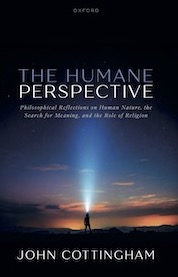The Humane Perspective:
Philosophical Reflections on Human Nature, The Search for Meaning, and the Role of Religion
Oxford University Press
forthcoming 2024
ISBN 9780198918912
Part One: Manifesto and Method
1. The Humane Perspective
(with Appendix, providing a Conspectus of the Volume)
2. What is Humane Philosophy and Why it is At Risk?
Part Two: Morality and Meaning
3. Integrity and Fragmentation
4. Happiness, Temporality, and Meaning
5. Philosophy, the Good Life, and Spirituality
6. Conversion, Self-discovery, and Moral Change
Part Three: Science and its Limits
7. Confronting the Cosmos: Scientific Rationality and Human Understanding.
8. Transcending Science: Humane Models of Religious Understanding
9. Brain Laterality and Religious Awareness
10. Which Naturalism?
Part Four: Reaching for the Transcendent
11. Religion and the Mystery of Existence
12. From Desire to Encounter: the Human Quest for the Infinite
13. The Meaning of Life and Transcendence
14. Engagement, Immersion, and Enactment
Bibliography
Index
This book brings together fourteen essays from the work of John Cottingham on moral philosophy and philosophy of religion spanning the past fifteen years. The chapters are closely related in so far as they all deal with the perennial challenges of human existence—the drive to understand the world we live in, the limits of scientific inquiry, the search for a good and meaningful life, and the human quest for transcendence. As well as being thematically linked, they share a common style and methodology, illustrating the distinctive goal that has informed the author’s work in recent years, that of promoting a more ‘humane’ conception of philosophizing. This conception is explained and defended in the substantial new essay that forms the first chapter of the volume. While in no way discarding the technical tools of the professional philosopher such as abstract argumentation and analysis, whose value is unquestionable, this approach is notable for drawing on the full range of resources available to the human mind, including those that depend on literary, poetic, imaginative, aesthetic, and emotional modes of awareness. In contrast to the model of the philosopher as a kind of detached scrutineer, the essays exemplify the belief that there is also a distinctive and valuable kind of philosophical understanding that requires a more involved and engaged stance. The topics dealt with fall broadly within the familiar domains of moral philosophy and philosophy of religion, but the reflections offered on these areas of human thought and practice always aim to be sensitive to how morality and religion actually operate in the lives of the human beings involved.


